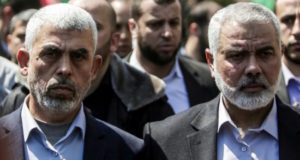
Egyptian sources say Hamas members have divided behind the group’s top 2 leaders, who don’t speak to one another, over Ismail Haniyeh’s outright rejection of an Egyptian deal which would have seen prisoners released, Israeli soldiers’ remains repatriated, and the easing of border restrictions into Egypt.
By Daniel Siryoti
A deep rift has formed within the Hamas leadership surrounding the ongoing, weekly Gaza border protests that have claimed the lives of dozens of demonstrators so far, with more demonstrations planned for the coming weeks.
A quarrel has erupted between the two strongest figures in the group – Hamas leader in Gaza Yahya Sinwar and Hamas political bureau chief Ismail Haniyeh, Israel Hayom recently learned from senior Hamas sources.
A delegation of Egyptian intelligence and security officials visiting Gaza submitted a proposal to Haniyeh: In exchange for Hamas halting demonstrations on the border with Israel, Egypt would open the Rafah border crossing with Gaza more frequently and grant additional entry passes, allowing an increased flow of travelers and goods between Gaza and Egypt.
According to a senior Hamas official, Hamas then received an ostensibly improved offer from Egypt to halt the campaign of border demonstrations in exchange for the possibility of significantly advancing a potential prisoner exchange deal with Israel, in addition to its offer of opening the Rafah terminal and easing the blockade on Gaza. Haniyeh’s refusal of this offer sparked tensions and unrest in the movement’s ranks resulting in a movement-wide split into two camps.

Hadar Goldin (L), Oron Shaul (C), Abera Mengistu (R) – Courtesy
Under the Egyptian proposal, Hamas would repatriate the bodies of Lt. Hadar Goldin and Staff Sgt. Oron Shaul, two Israeli soldiers killed in Gaza in 2014 and whose remains are being held by Hamas. In addition, Hamas would provide information regarding the whereabouts of three Israeli civilians in believed to be held by Hamas in Gaza: Averra Mengistu, Hisham al-Sayed and Jumaa Abu Ghanima. All three suffer from mental disabilities and are believed to have wandered into Gaza voluntarily in 2014, 2015 and 2016, respectively.
Under the Egyptian proposal, in exchange for information on the three civilians and the return of the soldiers’ remains, Israel would release several dozen Palestinian prisoners – mostly elderly, women, minors and prisoners nearing the end of their sentences – and hand over several dozen bodies of operatives from various Palestinian factions.
Haniyeh reportedly rejected the Egyptian proposal without consulting the heads of the movement or even divulging its details to the organization’s leadership.
“Not only did Haniyeh reject the improved proposal,” a senior Egyptian intelligence official told Israel Hayom, “he even rejected the invitation we gave him to come to Cairo with a delegation of Hamas officials to discuss details of the deal to stop the marches on the border and the possibility of a prisoner exchange. He refused to come to Cairo because he feared that he would be unable to withstand the pressure exerted on him.”
The official, who had come into contact with Haniyeh as part of an Egyptian security delegation to Gaza, added that high-ranking Hamas officials, including Sinwar, were furious with Haniyeh and had accused him of coordinating Hamas policy with Tehran rather than the group’s own leadership.

Iranian Supreme leader Ali Khamenei meets with Hamas leader Ismail Haniya – Photo passout via AP
“Haniyeh and Sinwar haven’t been speaking to each other because of the disagreement over the return marches,” the Egyptian official said, referring the weekly border demonstrations, “and also because of the rejection of the Egyptian proposal to include a prisoner swap with Israel in the deal to ease the blockade in exchange for cessation of the marches.”
“Sinwar exploded with rage and screamed at Haniyeh,” the official said “when he learned that [Haniyeh] wasn’t planning to accept the Egyptian delegation’s proposal.”
Meanwhile, a senior Hamas official in Gaza told Israel Hayom that “due to the quarrel between the two, Hamas has also divided in two distinct camps – supporters of Haniyeh and supporters of Sinwar.”
According to the official, there are voices in Hamas that argue that the border marches have run their course in their current format and that the diminishing number of demonstrators from week to week is actually undermining the potential for the grand finale demonstration. The final march, planned to coincide with the day on which Palestinians observe the Nakba (catastrophe) of having been displaced by the establishment of the State of Israel, is expected to draw more than 100,000 demonstrators. The official said that Sinwar and other high-ranking Hamas figures share this view.
Furthermore, an associate close to Sinwar told Israel Hayom that the Sinwar camp believes that if the border marches continue in their current format it could undo any progress that has been made thus far and that it could undermine the general Palestinian interests as well.
According to Sinwar, Haniyeh made a terrible mistake by rejecting the first Egyptian proposal and an even bigger mistake in rejecting the revised deal.
View original Israel Hayom publication at:
http://www.israelhayom.com/2018/04/24/internal-hamas-rift-prevents-potential-prisoner-swap-with-israel/






 Israeli New Shekel Exchange Rate
Israeli New Shekel Exchange Rate